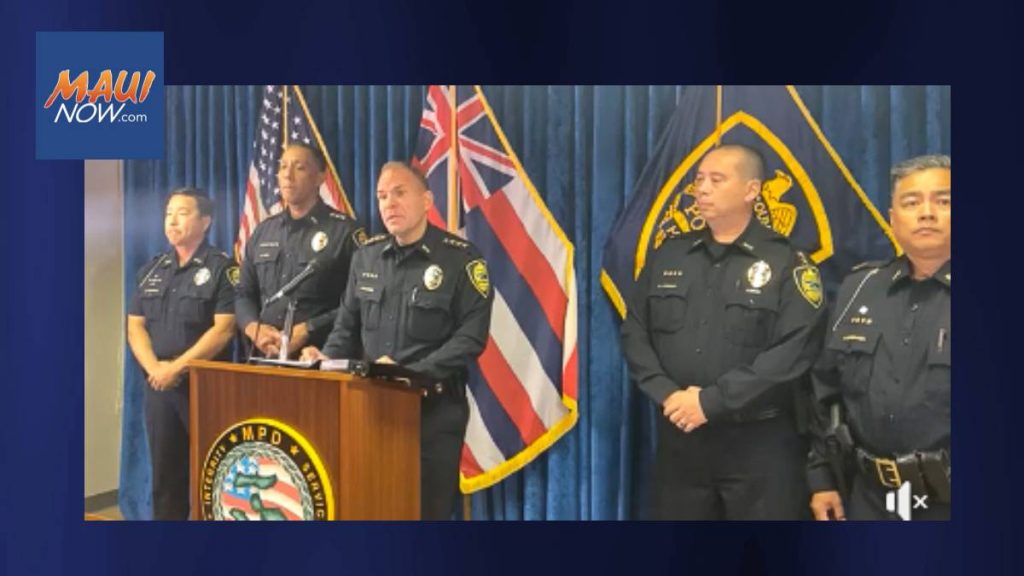Maui police union and Chief Pelletier have dueling press conferences over survey

Flanked by his command staff during a brief news conference Tuesday, new Maui Police Chief John Pelletier staunchly defended himself and his administration from the critical results of a survey taken by nearly 60% of his rank and file — and made public yesterday by the Maui Chapter of the State of Hawaiʻi Organization of Police Officers (SHOPO).
Chief Pelletier began his comments by saying that “although some would say a survey done at four months is premature,” he was “grateful” and “thankful for the learning opportunity.”
But the lack of collaboration between the police officers’ union and Chief Pelletier’s administration was evident by the dueling news conferences.
An hour later, at a conference room at the Maui Beach Hotel, Nick Krau, chair of the Maui Chapter of SHOPO, and SHOPO President Robert Cavaco, said the goal of the survey was to begin lines of communication and collaborate on solutions to challenging problems.
“We are not trying to get the chief fired,” Cavaco said. “We are not trying to attack him.”
Krau said: “We want to work with him and fix these issues.”
The survey pointed out low morale, a majority negative assessment of the chief, and two alarming areas about public safety:
- More than one-third of the 158 respondents said they were considering leaving MPD within the next two years – and this is from a department already with 101 vacancies (25% of its budgeted force of 400).
- 64% of respondents said patrol staffing is not adequate to swiftly respond to 9-1-1 calls.
“Although we did not create this staffing shortage or these other issues, I am responsible now,” Chief Pelletier said. “We are responsible now. And we are tackling these issues each and every day.”
And as an example, he said the conference room he was standing in had just been occupied 20 minutes earlier by new officer candidates.
But after emphasizing that “crime and evil don’t take days off” — and citing the recent deaths of three officers, including a police detective he worked with for 20 years in Las Vegas who died in an on-duty accident — Chief Pelletier also said organization changes take 5 to 7 years, a fact he said he made clear during his hiring process.
“I didn’t invent that or pull it out,” he said. “That’s from Harvard Business Review. … I wish we could do it in 5-7 months. That’s not practical. That’s not realistic.”
Back at the Maui Beach Hotel, the union officials said the problems needed to be solved much quicker than five plus years.
They said they hoped there would be a “fresh start” under Chief Pelletier, who was unanimously selected by the Maui Police Commission due to his stellar resume that included serving 22 years in a variety of leadership capacities at the Las Vegas Metropolitan Police Department.
But they said the problems Chief Pelletier inherited were only getting worse under his leadership. Morale was sinking fast, with many Maui police officers experiencing accumulative burnout due to the staffing crisis, with some working 12-hour days, 6 days a week to help make up for the unfilled positions.
So with the rank and file officers’ concerns and issues falling on deaf ears — and the fear of retaliation and “walking on eggshells” after watching three high-ranked officers (Assistant Chief Clyde Holokai, Capt. Ricky Uedoi and Lt. William Hankins) retire early due to the new leadership — Krau said the survey was commissioned to make sure MPD leadership and the public got a comprehensive picture of what’s wrong.
It was the first such survey in the 51-year history of SHOPO, according to Cavaco.
Krau said that MPD is losing officers faster than can be hired.
“It that trend continues, we will be at a very critical public safety crisis,” he said. “That seems to be the direction that we are heading.”
Cavaco said the MPD staffing shortages “absolutely” is affecting public safety now, with Krau adding that maybe he is “numb” to some of it because the department has been short staffed for a long time.
Cavaco conceded law enforcement staffing shortages is a national problem, with the other police departments in Hawai’I also experiencing a high number of vacancies. Cavaco said Honolulu is down about 329 officers out of 1,900; the Big Island is down 47 out of 430; and Kaua’I is short 19 out of 157. But Maui is down the highest percentage.
When asked about the 64% of the survey respondents who said there was not adequate staffing to swiftly respond to emergency calls, Chief Pelletier said: “Patrol needs to be the emphasis. We cannot let patrol be minimized. As we see issues or concerns or vacancies, as we see our staffing shortages, we got to make sure when you call 9-1-1, we are coming. We agree, that’s a priority.”
The vacancies also are affecting officer safety, Cavaco said. In the survey, 39% of the respondents said they have experienced a significant amount of time for backup to arrive (with another 16% saying it wasn’t applicable to their job, making that 39% figure low).
“We’re talking about rural areas of Makawao or Hana where there are only 3 or 4 officers patrolling vast large areas, and they don’t have any backup, and are out there by themselves,” Cavaco said. “That definitely is a safety risk.”
Cavaco said if he had a “magic wand,” he would have Chief Pelletier and his Deputy Chief Charles Hank III, also from Las Vegas, to “take off the uniform. Take off the stars on the shoulder Put on a T-shirt and shorts. Go down to the lineup room at the main station and meet with your people.” Cavaco said he would tell them to close the doors and ask the officers to express their feelings and then just listen. “You don’t have to agree but listen.”





_1768613517521.webp)







